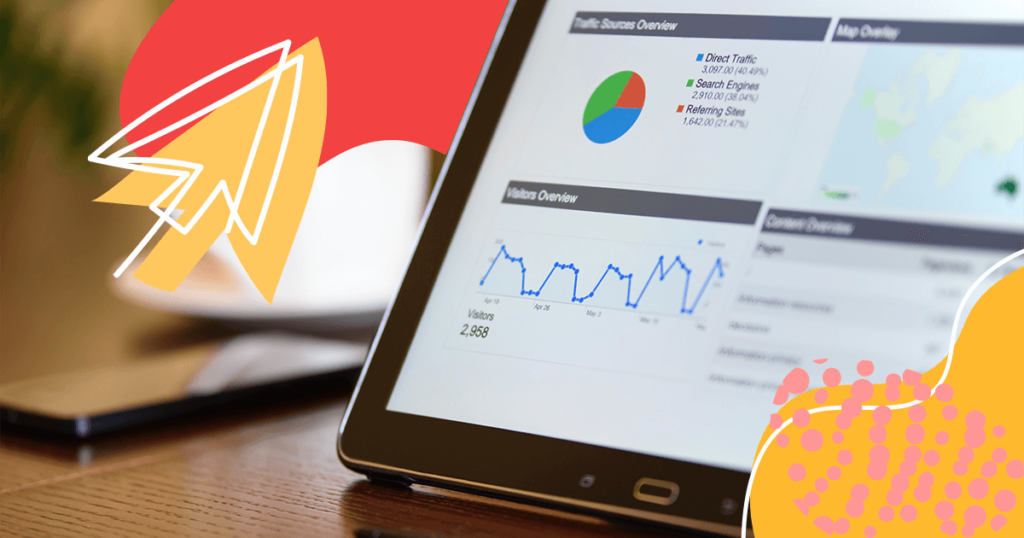If you’re like most professionals in the digital marketing sector, you’re likely already aware that, in just a few months, Google’s iconic Universal Analytics tool will officially be no more. Instead, it’s being thoroughly replaced by the newer Google Analytics 4, but what does that really mean for you as a marketer?
Here we’ll go over all the details regarding what you need to know about Google Analytics 4 vs Universal Analytics.
For example, how do the two really stack up against one another?
We’ll also cover everything you need to know to determine whether you should switch to GA4 or explore other alternatives.
What Is the Difference Between Google Analytics 4 (GA4) and Universal Analytics?
Although GA4 and Universal Analytics are similar tools designed to help digital marketers and website owners do more or less the same thing, the two programs operate very differently.
Here’s a closer look at some of the most significant differences between Google Analytics 4 vs Universal Analytics.
Privacy Concerns
User privacy has been an increasingly important concern online for a while now, so it’s probably not surprising that GA4 will take a very different approach to concerns like visitor privacy, data collection, and so forth.
- GA4 doesn’t collect or store IP addresses, which is really the biggest privacy change.
- It’s easier to delete data upon user request or as desired by the admin under the new GA4 model.
- You also have options for how long GA4 holds onto data.
Data Collection
You’ll also find that the way Google Analytics 4 collects data, in general, is very much in step with today’s omnichannel digital landscape.
In 2012, when Universal Analytics first hit the scene, only about 45 percent of web users had smartphones, and the number of collective apps out there was only in the hundreds of thousands.
Comparatively, at the start of 2021, 85 percent of people had a smartphone, and there were nearly 5 million apps out there. Naturally, those numbers have only continued to rise in the two years since.
GA4 takes these changes and ongoing trends into account, as well as the way the average buyer’s journey has changed as a result. You will now be able to view, assess, and compare data from all of your streams (including apps) in one convenient place.
Data Reporting
You’ll find that much of the data-centric language has also changed in Google Analytics 4 vs Universal Analytics. Here’s a screenshot that details what’s different and what’s the same.
Source: WordStream.com/Google
As you can see, GA4 has a lot of the information organized under a “life cycle” tab to help reflect the importance of not only attracting and satisfying customers but turning them into brand advocates. Behavior is also now referred to as engagement, and conversions have become monetization.
Keep in mind that both engagement and monetization are terms that can cover a lot of ground here in 2023 and beyond, and Google Analytics 4 is set up in a way that caters to that.
Events vs Sessions
As you likely already know, Universal Analytics collected and organized data based on visitor sessions. Each of those sessions further consisted of various types of “hits” associated with e-commerce, page visits, and so forth.
Source: WordStream.com/Google
In Google Analytics 4, all those occurrences (and more) are considered “events” instead. This includes first visits to your website, a new page view, etc. This change is designed to give marketers and web admins a lot more information about how consumers really interact with their assets, and it does do that.
However, it’s essential to realize that this change means past data doesn’t carry over when switching from Universal to GA4. Events are processed entirely differently from the hit-based data from before, so it will take some time to get used to the change and build up a data cache you can work with moving forward.
Greater Functionality
Source: WordStream.com/Google
One of the bigger (and better) differences associated with Google Analytics 4 vs Universal Analytics is the sheer functionality of the new platform (as you’ll see during set-up). Among other things, GA4 includes:
- The ability to customize the platform according to your actual needs by not only creating custom reports but adding them straight to your navigation interface under “reports”
- Machine learning capabilities that continue to build on the basic options offered in Universal Analytics starting from 2018 with the “insights” function
- Predictive analytics that is built right into the platform, so there’s no longer any need to acquire additional paid tools for the purpose
- Convenient anomaly detection capabilities
- Enhanced tools for tracking and measuring conversion paths, touchpoints to conversion, and more
And, of course, Google Analytics 4 continues to change and evolve on a near-daily basis, so there’s plenty to learn. But those familiar with Universal Analytics should have a relatively easy time of it overall.
Can I Use Both Universal Analytics and Google Analytics 4?
Support for Universal Analytics will officially become a thing of the past in July of 2023, so the day will eventually come when you’ll need to switch entirely from one platform to the other. But in the meantime, it’s possible to start fleshing out your future GA4 implementation while continuing with Universal Analytics.
For example, you can send events to both platforms using Google’s double-tagging approach. This will allow you to start building a data history in GA4 that will be ready and waiting for you whenever you are ready to switch over permanently.
Download our Google Analytics guide to find out more about Google Analytics.

Is It Worth Upgrading to Google Analytics 4?
As far as Google Analytics 4 vs Universal Analytics goes, Universal Analytics is (and was) a terrific tool. But GA4 promises to be even better, especially moving forward as SEO and the web at large continue to evolve and change.
In other words, Google Analytics 4 is an innovative, highly functional platform worth checking out. It’s also likely to be the future gold standard for web analytics platforms, so it’s worth your time to upgrade sooner rather than later.
Why Should I Move to GA4?
The sheer functionality of the Google Analytics 4 vs Universal Analytics is really the best reason to switch over. Yes, that level of functionality and customizability comes with a learning curve and will take some time to get used to. But July 2023 will be here sooner than you think for those still depending on Universal Analytics.
Also, the machine learning aspect of GA4 brings so much to the table when it comes to better targeting your digital marketing efforts and predicting the future behavior of your customers (as with churn rate, conversion potential, etc.). And the platform will only grow smarter as time goes on.
Is Google Analytics 4 Better Than Universal Analytics?
Both platforms are incredibly efficient and helpful to those looking to make genuine successes of their websites and online businesses. However, Universal Analytics represents the past of the web analytics world, while Google Analytics 4 is the future.
That said, GA4 is definitely a more customizable, functional platform than Universal Analytics. It certainly gives digital marketers more tools to work with, as well as ways to use those tools to their advantage, especially as we move forward into a cookieless future and more and more users opt out of sharing their data.
When Should I Switch to Google Analytics 4?
After July 2023, Universal Analytics will no longer be receiving ongoing support. Also, it will take some time to build up a data history cache to work from moving forward in Google Analytics 4.
That said, the sooner you get used to GA4 and begin putting it to work for you, the better. Remember, for now, you can still use both platforms, making it possible to generate a robust data history in GA4 while continuing to use Universal Analytics.
How Do I Upgrade Universal Analytics to GA4?
You can create a new Google Analytics 4 property to begin working with via Google’s GA4 Setup Assistant. The assistant will automatically copy your data over from Universal Analytics, activate your new GA4 property, and create a connection between GA4 and your existing presence on Universal Analytics.
The only thing that will not happen is that your historical data will not carry over. Due to the differences between how the two platforms collect and organize data, GA4 will only be able to collect data moving forward from its activation date.
How Do I Switch Between GA4 and UA?
You can easily switch between any accounts for which you currently have permission via the menu located in the top-left corner of your user dashboard. Use this menu to move at will between the Universal Analytics property you’ve been using and trusting for a while now and the new GA4 property you’ll be using in the future.
How Much Does GA4 Cost?
As with many Google properties and features – including Universal Analytics – Google Analytics 4 is free to use, and it won’t cost you anything to switch over from the old UA interface to the GA4 new one.
If you do need or want significantly more storage or functionality than is available in the base version of Google Analytics 4, you can consider upgrading to a Google Analytics 360 account. However, this can be costly, so it’s likely only an option you’ll need if you’re running a major corporation or brand.
How Long Does GA4 Keep Data?
In Universal Analytics, the default data retention setting was 26 months, but users could manually reset it to a shorter time frame if they wished. However, in Google Analytics 4, users can choose between two set timeframes for data retentions – 2 months or 14 months.
Some data assets may be limited to a two-month retention period regardless, though – as with data related to gender, interests, and age. Retention of larger properties is also subject to a two-month limit.
What Metrics Are Going Away in GA4?
Since the data model is entirely different in Google Analytics 4 vs Universal Analytics, it only makes sense that you’ll lose a lot of very familiar metrics you may have relied on heavily in the past.
For example, GA4’s data model no longer contains data related to average session duration. The loss of the session duration metric is really a given, as Google Analytics 4 does not categorize and organize data according to sessions at all anymore.
And for a while, GA4 did not include the bounce rate metric, either. This has since been added back to the mix. However, it is understandably very different from the metric long-time Universal Analytics users will be used to.
It’s also worth noting that GA4 introduced many new metrics designed to replace, add to, and improve upon any that were lost when switching over. Ultimately, all the necessary metrics are present and accounted for in one form or another. It will simply take time and ongoing use to get acquainted with them.
Wrap-Up
The pending move to Google Analytics4 vs Universal Analytics is just one of the ways we’re collectively moving forward into an exciting new future when it comes to digital marketing. But content will still be king no matter what, so a skilled content production team you can count on is a must.
Start assembling a new SEO team (or add to an existing one) with WriterAccess by Rock Content, home to some of the best, most experienced SEO content writers, designers, and editors worldwide. Sign up for a free WriterAccess trial today, and see what it’s all about!









